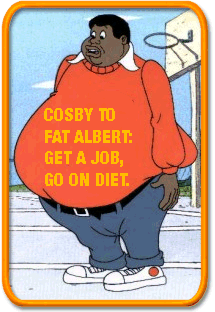
A kinder, gentler Cosby shows up in Chicago
BY MONROE ANDERSON, Sun-Times Columnist
A tamer, more timid Bill Cosby came to town last week. After an 18-month pitched battle with former DePaul University professor Michael Eric Dyson and others who have criticized him for bashing the black poor, the celebrity comedian was more defensive than defiant Wednesday as the featured attraction at the Chicago Public Schools’ fourth annual Parent Involvement Conference.
“In closing, ladies and gentlemen,” the entertainer/educator told the gathering of 7,000 or so, mostly poor parents, in the audience, “I have never given any crowd a whuppin’.”
True and false.
While picking up an award from the NAACP during the celebration of the 50th anniversary of the Supreme Court’s Brown vs. Board of Education decision, Cosby stood before a crowd of movers and shakers delivering an unmerciful tongue-lashing on the class of blacks who couldn’t afford the price of the ticket to see him honored. “They’re dragging me way down because the state, the city and all these people have to pick up the tab on them,” Cosby, who grew up in a Philadelphia public housing project, told the well-heeled NAACP audience at Constitution Hall, “because they don’t want to accept that they have to study to get an education.”
Dr. Dyson, now a University of Pennsylvania professor, heard Dr. Cosby, who earned an Ed.D. from the University of Massachusetts 29 years ago. Then Dyson wrote a book, Is Bill Cosby Right? Or Has the Black Middle Class Lost Its Mind? The professor’s scathing tome charged that the multimillionaire TV star was part of the “Afristocracy” -- intellectuals, lawyers, politicians, bankers and other professionals who look down with disdain on the black poor who constitute the “Ghettocracy,” those doing prison time, having babies out of wedlock and their hordes of impoverished children.
Others heard Cosby as well, taking his words as cover while returning to a time when poor blacks were fair game when assigning blame. In this month’s Esquire magazine, John Ridley, a black movie director, has an essay titled “The Manifesto of Ascendancy for the Modern American Nigger.”
“It’s time for ascended blacks to wish niggers good luck. Just as whites may be concerned with the good of all citizens but don’t travel their days worrying specifically about the well-being of hillbillies from Appalachia, we need to send niggers on their way. We need to start extolling the most virtuous of ourselves,” the ascended Ridley argues in a publication, whose readership is virtually all white male. “It is time to praise blacks who are merely undeniable in their individuality and exemplary in their levels of achievement.”
Forty years ago, the Black Power Movement cast dispersions on uppity blacks disdaining their less fortunate brethren. Even then, tensions between the two classes were centuries old, dating back to the days of house slaves and field slaves. In his outcry, Cosby managed to make it acceptable again to make poor blacks the butt of the racist joke. If you’re yearning for that sort of routine or if you’re among the devoted cadre of gay men who flock to his nationwide tour, then catch Charles Knipp’s act. A white drag queen in blackface, Knipp has fashioned an “Ignunce” show where he plays Shirley Q. Liquor, an African-American woman on welfare with 19 children.
I’m sure the creator of Clifton Huxtable wouldn’t find the creator of Ms. Liquor amusing. I’m also sure there would be more blacks in ascendency if they weren’t tethered. Princeton University sociologist Devah Pager recently released a study reporting that white men with criminal records have an equal or better chance of being hired than do young black men with no records. And, while Knipp cracks and Cosby clunks, in the last 16 years, real-life pregnancy and birth rates among black teenagers have plummeted 40 percent.
So I’m thankful that it was the loving, gentle sitcom father-figure who showed up in Chicago to urge real-life fathers to be at home with their children, parents to take steps to assure that their children do better than they did and everyone to realize the value of a good education. Television’s Dr. Huxtable knows what Constitution Hall’s Dr. Cosby did not: Life may imitate art, but it’s still a matter of whose life and whose art.

No comments:
Post a Comment